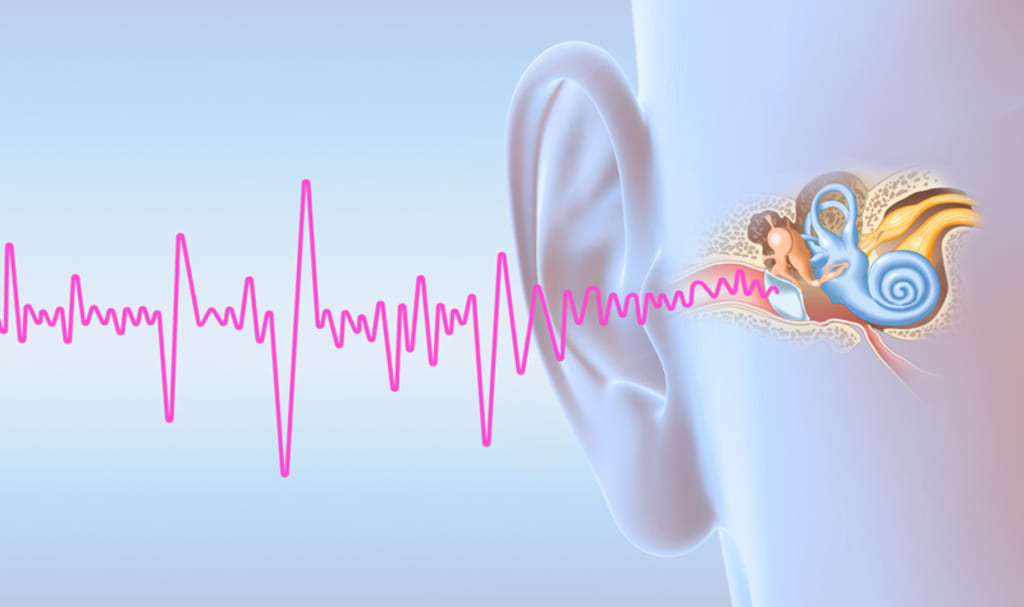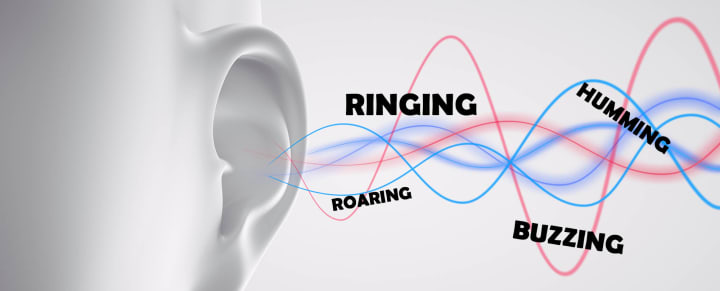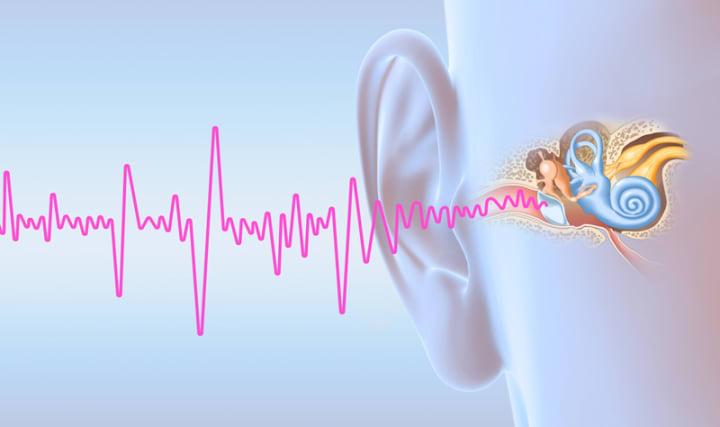Tinnitus and hearing loss - is there a connection?
Click here to learn more

Tinnitus and hearing loss are two common conditions that often go hand in hand. While they may have different causes, they often occur together, and one can exacerbate the other. In this article, we will explore the connection between tinnitus and hearing loss, including the causes and treatment options available.
What Is Tinnitus?
Tinnitus is a condition that affects the perception of sound. It is characterized by a ringing, buzzing, hissing, or humming sound in the ears that is not caused by an external sound source. Tinnitus can be temporary or permanent, and it can affect one or both ears. It is often associated with hearing loss, but it can also occur in people with normal hearing.
What Is Hearing Loss?
Hearing loss is a condition in which a person experiences a decrease in their ability to hear sounds. It can be caused by a variety of factors, including age, exposure to loud noises, certain medications, and infections. There are three types of hearing loss: conductive, sensorineural, and mixed.
Conductive hearing loss occurs when sound waves cannot reach the inner ear due to a blockage or damage to the outer or middle ear. Sensorineural hearing loss occurs when there is damage to the inner ear or the auditory nerve that connects the ear to the brain. Mixed hearing loss is a combination of both conductive and sensorineural hearing loss.
The Connection Between Tinnitus and Hearing Loss
Tinnitus and hearing loss are often linked because they share a common cause: damage to the inner ear. The inner ear contains thousands of tiny hair cells that are responsible for converting sound waves into electrical signals that are sent to the brain. When these hair cells are damaged, they can no longer function properly, resulting in hearing loss.
In some cases, tinnitus can be caused by the same damage to the hair cells in the inner ear that causes hearing loss. When the hair cells are damaged, they can send abnormal electrical signals to the brain, which can be perceived as the sound of tinnitus.
In other cases, tinnitus and hearing loss may be caused by different factors. For example, exposure to loud noises can cause both tinnitus and hearing loss. However, hearing loss may be more severe than the tinnitus in some cases, while in other cases, tinnitus may be more prominent.
Tinnitus can also worsen hearing loss by making it more difficult to distinguish between sounds. The constant ringing or buzzing in the ears can make it harder to hear speech or other sounds, particularly in noisy environments.
Causes of Tinnitus and Hearing Loss
Tinnitus and hearing loss can be caused by a variety of factors, including:
1. Age
Age-related hearing loss, also known as presbycusis, is a common cause of both tinnitus and hearing loss. As people age, the hair cells in the inner ear naturally begin to deteriorate, leading to a gradual decline in hearing ability.
2. Loud Noises
Exposure to loud noises, such as those from machinery, concerts, or firearms, can cause damage to the hair cells in the inner ear, leading to both tinnitus and hearing loss.
3. Medications
Certain medications, such as antibiotics, chemotherapy drugs, and non-steroidal anti-inflammatory drugs (NSAIDs), can cause tinnitus and hearing loss as side effects.
4. Infections
Infections, such as ear infections or meningitis, can cause damage to the hair cells in the inner ear, leading to both tinnitus and hearing loss.
5. Head and Neck Injuries
Injuries to the head or neck, such as those caused by car accidents or sports injuries, can damage the inner ear, leading to tinnitus and hearing loss.
6. Genetics
Some types of hearing loss and tinnitus have a genetic component,meaning they run in families. If you have a family history of hearing loss or tinnitus, you may be more likely to develop these conditions yourself.
Treatment Options for Tinnitus and Hearing Loss
Treatment options for tinnitus and hearing loss will depend on the underlying cause of the condition. In some cases, treating the underlying cause can alleviate both tinnitus and hearing loss. For example, if the cause is medication, stopping or changing the medication may help.
However, in many cases, there is no cure for tinnitus or hearing loss. Treatment options focus on managing the symptoms and improving quality of life.
1. Hearing Aids
Hearing aids are a common treatment option for both tinnitus and hearing loss. They work by amplifying external sounds, making them louder and easier to hear. This can help reduce the impact of tinnitus and make it easier to distinguish between sounds.
Some hearing aids are specifically designed to help manage tinnitus by playing soothing sounds or music to help mask the ringing or buzzing sound. These are known as tinnitus masking devices.
When choosing a hearing aid for tinnitus, it is important to select a model that is comfortable to wear and provides good sound quality. Your audiologist can help you choose the best hearing aid for your needs.
2. Sound Therapy
Sound therapy involves using external sounds to help manage the symptoms of tinnitus. This can include white noise, music, or other calming sounds. The goal of sound therapy is to distract the brain from the sound of tinnitus, making it less noticeable.
Sound therapy can be delivered through hearing aids, tinnitus masking devices, or through specialized sound machines. Some people find that simply listening to calming music or sounds before bed can help them sleep better with tinnitus.
3. Cognitive Behavioral Therapy (CBT)
Cognitive Behavioral Therapy (CBT) is a type of talk therapy that can be helpful for people with tinnitus. It involves working with a therapist to identify negative thoughts and feelings associated with tinnitus and replacing them with more positive ones.
CBT can also teach coping strategies to help manage the symptoms of tinnitus, such as deep breathing, mindfulness, and relaxation techniques.
4. Medications
There are no medications specifically designed to treat tinnitus, but some medications may be helpful in managing the symptoms. For example, antidepressants and antianxiety medications may be helpful for people with tinnitus who are experiencing anxiety or depression related to their condition.
5. Lifestyle Changes
Making certain lifestyle changes can also be helpful in managing tinnitus and hearing loss. These include:
Avoiding loud noises: Exposure to loud noises can worsen tinnitus and hearing loss. Wearing earplugs or earmuffs in noisy environments can help protect your hearing.
Managing stress: Stress can exacerbate the symptoms of tinnitus. Engaging in relaxation techniques, such as meditation or yoga, can be helpful in reducing stress levels.
Eating a healthy diet: Eating a balanced diet rich in vitamins and minerals can be helpful in maintaining overall health and reducing the risk of conditions that can lead to tinnitus and hearing loss.
Getting enough sleep: Getting adequate sleep is important for overall health and can be helpful in managing the symptoms of tinnitus. Establishing a regular sleep routine and creating a relaxing sleep environment can help improve sleep quality.

Conclusion
Tinnitus and hearing loss are two common conditions that often occur together. While they may have different causes, they are often linked by damage to the inner ear. Treatment options focus on managing the symptoms of both conditions and improving quality of life. Hearing aids, sound therapy, cognitive behavioral therapy, medications, and lifestyle changes can all be helpful in managing tinnitus and hearing loss. If you are experiencing symptoms of tinnitus or hearing loss, it is important to speak with your healthcare provider or an audiologist to determine the underlying cause and develop an appropriate treatment plan.
Preventing hearing loss and tinnitus is also important. Avoiding loud noises, wearing hearing protection in noisy environments, and maintaining a healthy diet and lifestyle can all help reduce the risk of developing these conditions.
By understanding the link between tinnitus and hearing loss and seeking appropriate treatment, it is possible to manage the symptoms of both conditions and improve quality of life.
So lets's get this sorted out!
Say goodbye to tinnitus and hello to peace of mind! Try our 100% natural blend support today and start experiencing the relief you deserve. Don't let tinnitus control your life any longer - take action now and discover the power of nature."
Click Here to Try our 100% natural blend support today

Affiliate Disclosure:
There are links on this site that can be defined as affiliate links. This means that I may receive a small commission. If you purchase something through links provided on this website.
About the Creator
Your GUIDE
Say goodbye to tinnitus and hello to peace of mind! Try our 100% natural blend support today and start experiencing the relief you deserve. Don't let tinnitus control your life any longer - take action now and discover the power of nature
Enjoyed the story? Support the Creator.
Subscribe for free to receive all their stories in your feed. You could also pledge your support or give them a one-off tip, letting them know you appreciate their work.






Comments
There are no comments for this story
Be the first to respond and start the conversation.